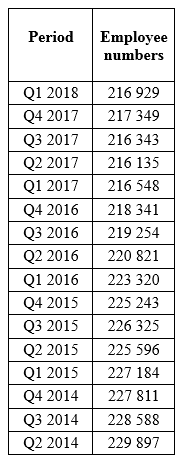Deutsche Telekom embraces automation to efficiently reduce workforceDeutsche Telekom embraces automation to efficiently reduce workforce
Deutsche Telekom expects to grow its revenues by 1% per year through to 2021, but it also expects to continue a long-standing trend of streamlining its workforce in favour of automation and digitalisation.
May 24, 2018

Deutsche Telekom expects to grow its revenues by 1% per year through to 2021, but it also expects to continue a long-standing trend of streamlining its workforce in favour of automation and digitalisation.
At the firm’s Capital Markets Day in Bonn, DT said it plans to make a host of announcements including changes to how dividends are structured owing to greater contributions to revenues from the US, as well as outlining the promising prospects of the convergence business, but it also snuck in a brief announcement about further staff reductions. It should now be considered good PR form to sandwich bad news in between the good, but this is not a new trend for the German telco. As you can see from the table on the right-hand side streamlining the workforce is simply part of the day-job.
 Through to 2021 the team plan to realise cost efficiencies of €1.5 billion, half of which relates to staffing. CEO Timotheus Höttges spoke of the importance of reskilling the current workforce, and also the fact the business is hiring at the same time as shaving the workforce. Some of the staffing efficiencies will be realised through an early-retirement scheme, but you simply cannot argue with the numbers; DT is reducing the size of its workforce.
Through to 2021 the team plan to realise cost efficiencies of €1.5 billion, half of which relates to staffing. CEO Timotheus Höttges spoke of the importance of reskilling the current workforce, and also the fact the business is hiring at the same time as shaving the workforce. Some of the staffing efficiencies will be realised through an early-retirement scheme, but you simply cannot argue with the numbers; DT is reducing the size of its workforce.
This is a trend which we should not be incredibly surprised by. With the progression of the artificial intelligence world, as well as the emergence of more automated business process software, multinational corporations are going to search for ways to reduce the biggest burden on the spreadsheets; the people who do the work.
The promise of artificial intelligence is the mundane tasks can be offloaded to a machine to allow human employees to focus on high value tasks. It was heralded as a positive for the workforce, but is starting to appear as anything but.
“In particular, the Group is deploying automation and digitalization to reduce indirect costs outside of the United States by 1.5 billion euros by 2021. Around a half of these cuts will come from non-staff-related savings in areas such as real estate and legacy IT platforms, some of which will result from the migration to IP, due to be concluded for consumers in Germany by 2019,” said DT spokesperson, Andreas Fuchs.
Whether the reasoning is early-retirement or more efficient recruitment strategies, the numbers are absolute. DT is decreasing its workforce and becoming more reliant on automation as a means to operate the business. Worryingly for workforces around the world, these are still the early days of automation. It is still in its embryonic days of development with more powerful and efficient forms of the technology to follow. If jobs are under threat from the technology today, what will it be like in five years’ time?
Deutsche Telekom is currently a business which is growing and has promising prospects. CFO Thomas Dannenfeldt highlighted to investors there might be a ‘blip’ on the spreadsheets which will affect Earnings Per Share should the Sprint merger be approved, but this would only be a two-year ‘valley’. Year three would see the company recover, in theory being in a strong position as a result of an increased US footprint. The T-Mobile/Sprint merger will of course increase the headcount, which might disguise the workforce streamlining process, but employee numbers are seemingly only heading in one direction at DT.
Höttges and Dannenfeldt were coy on how much the workforce would be reduced by through this efficiency programme, but it seems automation isn’t living up to the glorious promise of adding value to an employee’s productivity. It’s simply just taking all of it away; who would have seen this coming?
About the Author
You May Also Like










.png?width=300&auto=webp&quality=80&disable=upscale)


_1.jpg?width=300&auto=webp&quality=80&disable=upscale)